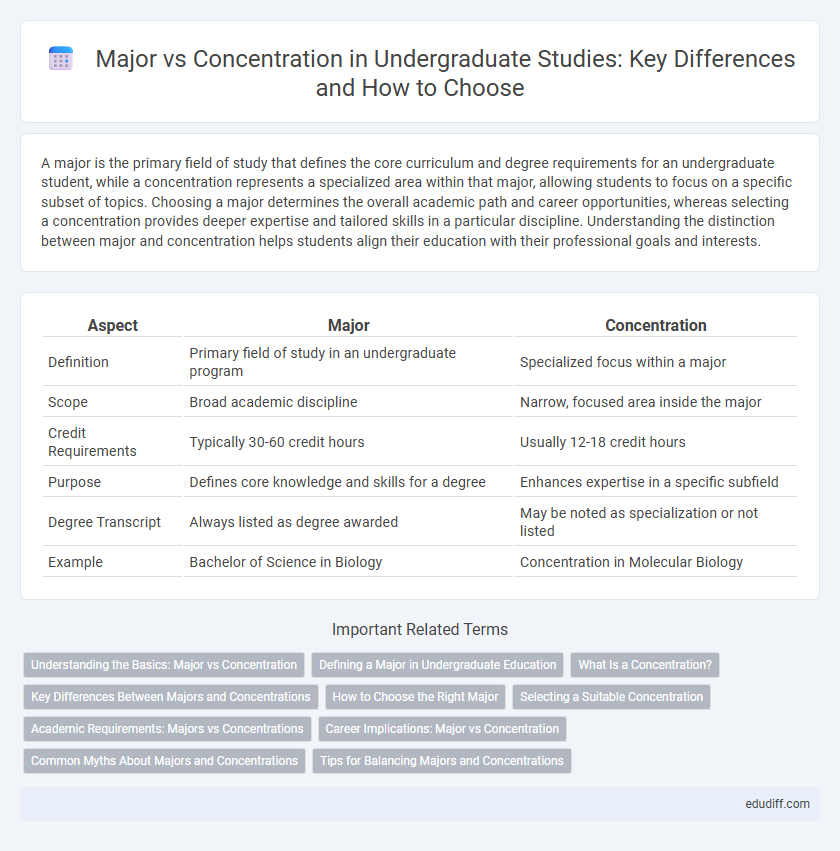A major is the primary field of study that defines the core curriculum and degree requirements for an undergraduate student, while a concentration represents a specialized area within that major, allowing students to focus on a specific subset of topics. Choosing a major determines the overall academic path and career opportunities, whereas selecting a concentration provides deeper expertise and tailored skills in a particular discipline. Understanding the distinction between major and concentration helps students align their education with their professional goals and interests.
Table of Comparison
| Aspect | Major | Concentration |
|---|---|---|
| Definition | Primary field of study in an undergraduate program | Specialized focus within a major |
| Scope | Broad academic discipline | Narrow, focused area inside the major |
| Credit Requirements | Typically 30-60 credit hours | Usually 12-18 credit hours |
| Purpose | Defines core knowledge and skills for a degree | Enhances expertise in a specific subfield |
| Degree Transcript | Always listed as degree awarded | May be noted as specialization or not listed |
| Example | Bachelor of Science in Biology | Concentration in Molecular Biology |
Understanding the Basics: Major vs Concentration
A major in undergraduate studies represents the primary field of academic focus, requiring a comprehensive set of courses that build foundational knowledge and core competencies in a discipline. A concentration, often a subset within a major, allows students to specialize further by focusing on a specific area or niche within that broader field, enhancing expertise and career alignment. Understanding the distinction between major and concentration can guide students in tailoring their education to meet academic goals and professional aspirations effectively.
Defining a Major in Undergraduate Education
A major in undergraduate education is a primary field of study that defines the core academic focus for a student, typically requiring completion of a set number of credit hours within a discipline such as biology, economics, or psychology. It provides in-depth knowledge, specialized skills, and foundational theories essential to the chosen subject area, preparing students for careers or advanced studies. Majors are structured to ensure comprehensive understanding and mastery of key concepts, often culminating in a capstone project or comprehensive exams.
What Is a Concentration?
A concentration is a specialized area of study within a broader undergraduate major, allowing students to gain deeper knowledge and skills in a specific subject. It provides focused coursework and expertise that enhances a student's understanding beyond the general curriculum of the major. Concentrations help tailor an academic program to align with career goals or personal interests while maintaining the core requirements of the major.
Key Differences Between Majors and Concentrations
Majors constitute the primary field of study guiding an undergraduate's academic path, often encompassing a broad curriculum within disciplines like Biology or Economics. Concentrations serve as specialized subsets within a major, allowing students to focus on niche areas such as Molecular Biology or Behavioral Economics. The key difference lies in scope; majors define the overall academic focus, while concentrations hone in on specific interests or career goals within that field.
How to Choose the Right Major
Selecting the right undergraduate major requires assessing personal interests, career goals, and academic strengths to ensure long-term satisfaction and success. Researching potential majors' curricula, job market demand, and alignment with future opportunities helps streamline decision-making. Consulting academic advisors and exploring internships can provide practical insights that differentiate a major from a concentration within a broader field.
Selecting a Suitable Concentration
Selecting a suitable concentration within an undergraduate major involves evaluating personal interests, career goals, and academic strengths to ensure alignment with future opportunities. Concentrations provide specialized knowledge and skills that complement the broader major, enhancing expertise in targeted fields such as finance within business or molecular biology in biology. Researching program curriculum, faculty expertise, and industry demand helps students make informed decisions that optimize educational and professional outcomes.
Academic Requirements: Majors vs Concentrations
Academic requirements for a major typically include a broader range of core courses and electives that provide comprehensive knowledge in a specific field, often extending to general education requirements. Concentrations require students to complete a focused subset of courses within a major, allowing specialization in a particular niche without the extensive coursework mandated by the major itself. Degree completion depends primarily on fulfilling the major's core curriculum, while the concentration enhances expertise by emphasizing targeted academic content.
Career Implications: Major vs Concentration
Choosing a major determines the primary field of study that shapes foundational skills and knowledge, directly influencing job opportunities and career paths. A concentration, as a specialized subset within the major, enhances expertise in niche areas, providing a competitive advantage in specific industries or roles. Employers often value majors for overall competency while concentrations signal targeted skills beneficial for specialized career advancement.
Common Myths About Majors and Concentrations
Many students mistakenly believe that majors and concentrations are interchangeable, but majors represent the primary field of study while concentrations offer specialized areas within that major. Another common myth is that choosing a concentration limits career flexibility, whereas it often enhances expertise and job market competitiveness. Additionally, some think switching majors means losing credits, but academic advisors typically help transfer relevant courses to avoid delays.
Tips for Balancing Majors and Concentrations
Balancing majors and concentrations requires strategic time management and clear academic planning to meet graduation requirements efficiently. Prioritize core courses within your major while selecting complementary concentration classes that enhance your skill set and career goals. Utilize advising resources to tailor schedules that optimize workload and support academic success across both areas.
Major vs Concentration Infographic

 edudiff.com
edudiff.com